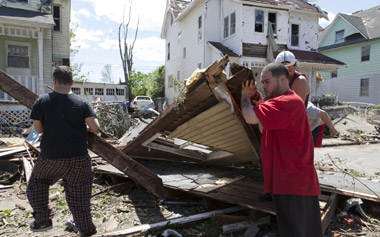Springfield has held the unhappy distinction of being the foreclosure capital of Massachusetts; last year, 595 properties were foreclosed on in the City of Homes, more than in any other municipality in the state, including Boston.
Foreclosure rates have been slowing this year, although some experts suggest that that’s not so much a sign that struggling homeowners have begun to find their footing as an indication that banks, already burdened with too many foreclosed properties that they can’t sell, have slowed down their pursuit of new foreclosures. Also tempering that limited good news: the June 1 tornado that ripped through the city, leaving many in the city without homes. More than 500 units in the city were destroyed or left uninhabitable, including many in poorer parts of the city, such as the South End and Six Corners.
Last week, the Springfield City Council passed a resolution seeking some relief for homeowners and renters for whom the tornado might be the final blow in their struggle to stay in their homes. The measure (which, as a resolution, has no real authority) urges banks and mortgage companies to “implement a voluntary moratorium on foreclosures and no-fault evictions for the residents of the City.” The resolution, which was sponsored by Ward 6 Councilor Amaad Rivera, Ward 4 Councilor Henry Twiggs, and at-large Councilors Tim Rooke and Jose Tosado (the latter is also Council president and a mayoral candidate), passed unanimously.
The Council vote was followed by a plea from the Springfield No One Leaves Coalition—which advocates for residents facing foreclosures and evictions—to Gov. Deval Patrick to lend his support to that effort. In an open letter to the governor, No One Leaves organizers Lara Shepard-Blue and Malcolm Chu noted that after the federal government declared Springfield a disaster area (a designation also given on the state level), the U.S. Department of Housing and Urban Development implemented an immediate 90-day moratorium on foreclosures on loans backed by the Federal Housing Administration. “Given the devastation of our city and the massive displacement of Springfield families, we need the forbearance and moratorium to be immediately extended to all banks, as well as an immediate moratorium on no-fault evictions,” the organizers wrote. “Please do everything in your power to support this forbearance and moratorium as soon as possible to prevent further displacement of Springfield families as our city attempts to recover from the tornado disaster.”
The letter also thanked Patrick for his “leadership in support of Springfield’s recovery and rebuilding” and his “focused attention and presence in our city over the past three weeks, as well as [his] commitment of state resources,” and ended with this reminder that the city’s recovery depends on the involvement of the entire community: “We urge you to remain an active partner in addressing our city’s housing needs. Please make sure that community-based organizations like ours will have a genuine seat at the table during the recovery and rebuilding process.”



